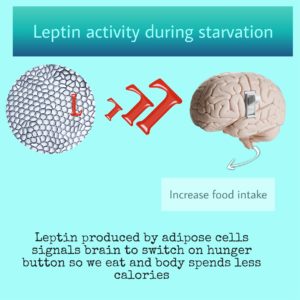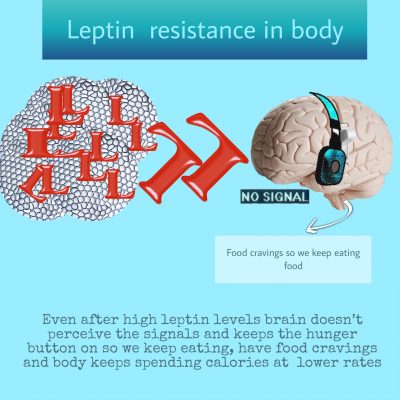
Leptin and Leptin Resistance.. Are you struggling to stick to a diet plan but not able to curb your food cravings? You are eating well but never feel full? You have tried a numerous exercise plans, gym memberships but never seem to loose weight?
When it comes to weight loss, it seems we’ve got it all wrong from ages. We believe that weight loss is all about dieting and exercises but what if weight gain is just a symptom of underlying health problem? If you can’t seem to lose weight despite exercising and eating a diverse diet of good food, you probably have leptin issues, a hormone that regulates weight which is a sign that something more is going on than a simple lack of willpower or the occasional indulgence.
Leptin plays an important role in not only in weight regulation but overall health as Leptin issues are now being associated with other health issues like diabetes, high blood pressure, heart disease, stroke and infertility.
What Is Leptin and How Does It Work?
Leptin is a hormone produced by our fat cells to tell our brain how much body fat they carry. High levels of leptin tell our brain that body has adequate amount of fat stored and it should stop eating more while low levels tell brain that fat stores are low and it should eat.
Putting in simple words amount of leptin control starvation, hunger and feeling of satiety. A decease leptin in body signals starvation, increase our appetite making us eat while increase in leptin gives us feeling of satiety. This is why it’s often referred to as the satiety hormone, starvation hormone or hunger hormone.
Leptin controls our appetite and calories consumption. This will further regulate how much fat our body will store by signaling brain.
Let just assume that our body has food shortage (or we are starving), food shortage means decrease in body fat and lesser amount of leptin produced. This reduced leptin will signal brain to eat more and burn calories at less rate (to conserve energy for essential functions).
On the other hand, when we eat, our body fat goes up causing an increase leptin levels which signals brain to eat less, consume calories in normal order and prevent excessive eating or curb the food cravings.

Leptin’s main role is long-term regulation of energy, including the number of calories we eat and expend, as well as how much fat we store in our body
This whole cycle of leptin evolved to keep humans from starving or overeating, both of which would have made us less likely to survive in the natural environment.
Leptin In obese person
A normal leptin cycle seems to work the same way with obese persons having lots of fats and leptin levels like in non-obese persons. Assuming this, leptin is supposed to work normally, many obese people should naturally limit their food intake. In other words, their brains should know that they have plenty of energy stored.
However, many obese people are not able to control their food cravings even after fair amount of leptin in body. This is due to condition called Leptin resistance -a condition in which our body does not respond to Leptin.

What is Leptin resistance?
Leptin resistance is a condition when there’s plenty of the hormone available but its signal to brain is impaired and our brain stops acknowledging the hormone’s signal.
When someone has impaired signaling to brain even after having more than enough of the hormone available and energy stored in the body, brain does not recognize it and thinks the body is still hungry. This makes the person to crave and eat more while reducing energy expenditure (to conserve energy for essential body functions).
Thus, the person not only eats more but also burn less calories resulting in more fats deposition and weight gain in the body.

Leptin resistance is a major reason behind most of failing diet and exercise plans, one can literally eat like rabbit and live in gym and will still have trouble losing weight.
How does Leptin resistance Effect Healthy Dieting and Weight Loss?
Whenever a person tries to lose fat, leptin levels decrease significantly due to decrease in fat stores which brain interprets as a starvation signal and initiate its mechanisms to regain the lost fat. The person now has increased appetite with strong food cravings, reduced motivation to exercise and body burns less calories. Thus, the person regains fats and body weight he lost while dieting.
The vicious cycle of losing weight and then re-gaining and becoming increasingly leptin resistant over time.
What are the Causes of Leptin Resistance?
Leptin resistance can be caused by several factors. The two most common causes include inflammation, free fatty acids and poor gut health. Inflammation is caused by our lifestyle factors such as stress, being busy, not getting enough sleep, poor gut health, eating high sugar foods, alcohol etc. Having elevated free fatty acids in your bloodstream may increase fat metabolites in your brain and interfere with leptin signaling.
Over recent years, many environmental chemicals have been shown to disrupt the actions of hormones and have been termed endocrine-disrupting chemicals (EDCs) or endocrine disruptors. Among these, chemicals that are linked to obesity are called obesogens. This includes compounds to which the human population is exposed in daily life through their use in pesticides/herbicides, industrial and household products, plastics, detergents, flame retardants and as ingredients in personal care products. These compounds can increase the number and/or size of fat cells, affect the body’s regulation of hunger and fullness and alter the metabolism by storing calories as fat.
How Do I Know If I’m Leptin Resistant?
It may sound too simple, but – just look in the mirror or see if you can grab a handful of fat around the middle of your body. Basically, there’s a really strong chance that leptin is not doing its job inside you if you are overweight. You can check by simply answering here:
- Is it difficult for you to lose weight?
- When you go on a diet, can you drop some pounds but still look flabby?
- Do you hold onto weight in your midsection, no matter how much you try to lose it?
- Do you have trouble keeping weight off?
- Are you constantly hungry? Do you crave sugary foods?
- Are you stressed out a lot?
Can Leptin resistance be reversed?
Leptin resistance is now one of main reasons for unhealthy weight gain or obesity and its associated health implications. The fact that Leptin resistance and its implications are not due to laziness or lack of will power but due to strong biochemical mechanisms, makes its elimination more challenging. Improving leptin resistance requires a long-term lifestyle changes and a very strong commitment to them. Significant diet and life style changes are most important strategies along with strong resolution to stick to them can help improve leptin resistance.

